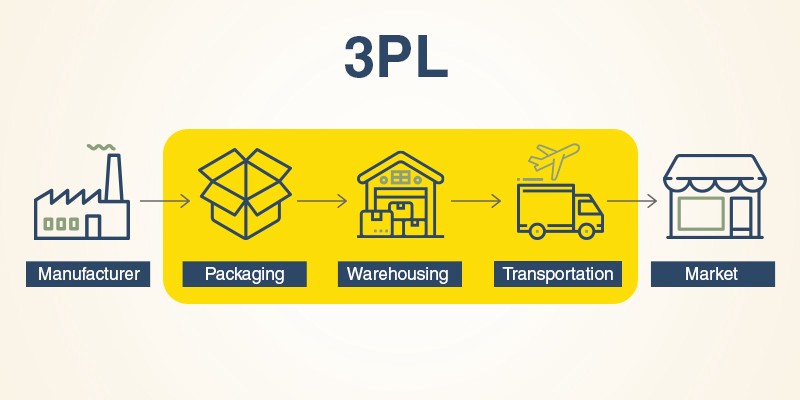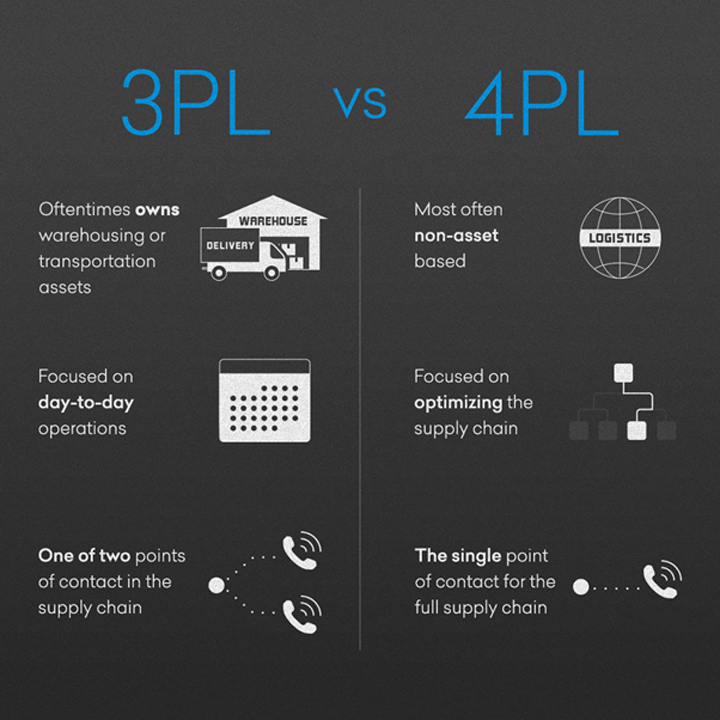3PL or 4PL…or even a 5PL?
Logistics loves an acronym. Always has, probably always will. 3PL and 4PL are definitely two of the most common. In this section, we will unpick exactly what they are and what are the key differentials.
Top hint: To help you navigate the extensive list of acronyms (and general Logistics terms) that are used on a daily basis, we have compiled the jargon busting section here to help.
We will get right into it….
What is a 3PL? Why do you need one? What is the difference between a 3PL and a 4PL?
If you require a service that transports or stores products then you will have probably heard of a 3PL (Third Party Logistics) or 4PL (Fourth Party Logistics), but what are the real differences in the service they provide?
Well, before we delve into the 3PL’s and 4PL’s, it is worth pointing out that there are in fact other ‘PLs’ including 1PL, 2PL and a 5PL!
Let’s start at the beginning…
1 PL (First Party Logistics)
The simplest form to describe, a 1PL is any transport company that moves goods from one location to another. An example of this could be a log delivery company that delivers its wood on its vehicles, directly to the customer.
2 PL (Second Party Logistics)
A 2PL is a company that handles other companies’ goods on their owned assets. There are many great examples of 2PL’s including ocean freight providers, haulage companies, airlines or warehouse and storage providers.
What is a 3PL?
At the 3PL level, it starts to get a little more complex. A 3PL manages all (or part) of a company’s logistics operations, overseeing the 1PL and 2PL relationships. 3PLs have grown in popularity over the last 20-30 years as companies have realised the benefits and cost efficiencies of outsourcing the warehousing, transport and fulfilment services to a third party. Ultimately, this allows businesses to focus on their core business of selling their products, not spending money and resource on trying to become logistics experts!

What services do a 3PL usually provide?
A good 3PL can offer you one, many or all of the of the following services:
- Warehousing, storage and inventory management
- Freight forwarding
- Customs clearance
- Air freight
- Ocean freight
- Road haulage
- Cross-docking
- Export
- Returns management
Does utilising a 3PL mean a company doesn’t need a logistics department?
Essentially a 3PL can act as a company’s logistics department, running logistics so that the business can focus on selling its core product.
3PL’s can either be asset based or non-asset based, or a combination of the both, depending on the services being provided.
Where a 3PL doesn’t own the assets, they are able to leverage their relationships to secure space for the products, be that on a plane, in a truck or in a warehouse.
Advantages of using a 3PL
As referenced above, there can be significant benefits as a result of utilising a 3PL. The main benefit can be cost savings borne about by allowing experts to run the logistic, whilst you focus on your business.
Of course, larger companies might have the funds and resources to finance their own warehouse, fleet of vehicles and employees but even so, it can often be of benefit for them to outsource to a 3PL.
Companies look to build long term relationships with 3PLs in order to realise continuous improvement initiatives which further improve operations and reduce costs. Long term relationships also allow the 3PL to leverage the volume to reduce costs of carriage and warehousing. Lastly, one benefit of these relationships is that the 3PL should be able to assist you in acquiring capacity for transport in times of volatility (Peak shipping or most of 2021!), which ensures your goods can reach your market.
What is a 4PL?
A 4PL is the next layer of management and overview across a 3PL, often managing elements of the 3PLs activities. A 4PL will focus on the optimisation of the entire logistics function and provides holistic supply chain management. Often they are more consultative in nature and may not even own any assets themselves, rather they review the supply chain/logistics in order to create efficiencies and reduce costs.
Advantages of using a 4PL?
4PLs can add significant value to companies that have complex and far-reaching geographical supply chains. They provide a holistic view that should help to provide efficiencies in the supply chain.
Often these 4PLs are non-asset or asset-lite and so they are able to look for the best solution for your business needs, rather than looking to utilise their own assets.
A 4PL is one point of contact, one company to oversee your supply chain. This saves the hassle and complexity of managing multiple providers and ensures further efficiencies for your business!
Let us recap on the differences between a 3PL and a 4PL:

What is a 5PL?
A 5PL handles all the logistics needs of a company, looking beyond mere supply chain management but also looking at the entire supply chain network. A 5PL acts as a close strategic partner to its clients and works closely with the client's in-house teams. Thus, the 5PL firm is responsible for many critical components of the client's supply chain and manages them on behalf of the client.
A 5PL will often have 3 key areas of responsibility, beyond managing 3PLs and 4PLs:
Determining and defining the logistics requirements
Planning the most efficient logistics process
Executing, managing, evaluating and improving the entire supply network
Most 5PLs specialise in big data and leveraging technology to drive efficiency. Currently, they are most valuable to e-commerce businesses than companies with a bricks-and-mortar presence.
Advantages of using a 5PL?
For primarily digital providers, they are can help to manage and transform your supply chain. Their ability to manage the supply network makes them appealing to fast growing online retailers for whom a highly efficient and functioning supply network is pivotal to their success.
So, which one should I choose; 1PL, 2PL, 3PL, 4PL or 5PL?

Ultimately, it is up to you and your business to define what it needs from a provider and that will determine the solution. If you have significant inhouse resource that can handle the capacity of managing providers and supporting the movement of your goods from A to B then the support you require will be minimal. If you are a high growth e-commerce company that has no resource or experience in logistics and needs a partner to manage their supply chain, optimise and grow with them, then you will require more comprehensive support from your logistics provider.
We hope this article was useful and informative. Of course, listed in the LOGISTO Directory we have a number of 3PL, 4PL and 5PL providers that you can reach out to in discuss your requirements. As always, we are also here to answer any questions and so please reach out to us via the contact us page and we will do our best to help.
Thank you
The LOGISTO Team